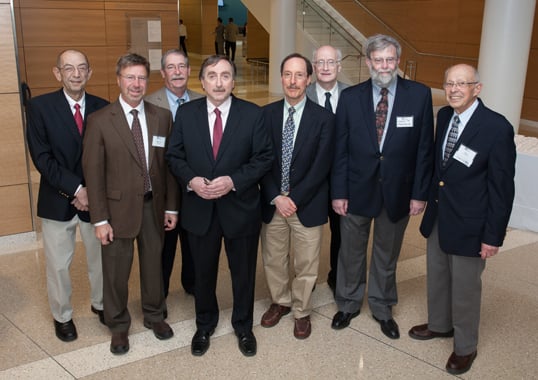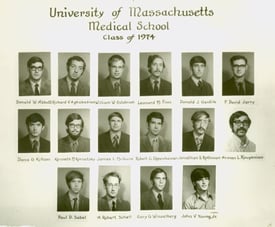
Forty years ago, Massachusetts’ new public medical school celebrated an event some thought might never happen: the first UMass Medical School Commencement ceremony. After the many years of political wrangling that preceded the school’s founding, the 16 newly minted doctors were tangible proof that the hard work had finally paid off. The following story is based on oral history interviews that were conducted by Ellen More, PhD, head of the Office of Medical History and Archives of the Lamar Soutter Library, and professor of psychiatry.

Some members of the Class of 1974 returned to campus for their 40th Reunion in May: From left, Richard V. Aghababian, MD; Paul Sabel, MD; Donald Abbott, MD; John Rothman, MD; Leonard Finn, MD; A. Robert Schell, MD; and Kenneth Kornetsky, MD; with former faculty member Moe Goodman, PhD.
According to some members of UMass Medical School’s first graduating class, their educational experience was exciting and rewarding, but filled with pressure to succeed. Just as the students were taking a chance on an unproven educational institution, so were the faculty, who were recruited from other established institutions to create a public medical school that was more accessible to students from Massachusetts, with the ultimate goal of producing more doctors for the state's residents.
“I felt, and I think most of my classmates felt, that we really had to work hard because we didn’t want to disappoint anybody, because so many people were making such a great effort to make this thing happen,” said Richard V. Aghababian, MD, professor emeritus of emergency medicine and founding chair of the Department of Emergency Medicine. “It just felt that if we made some missteps, if we didn’t cut the mustard or live up to people’s expectations, the school wouldn’t survive and it would be all on our heads. I think that was the subconscious thinking that was going on that kept us going.”
Some members of the class embraced the role of pioneer, while others had different reasons for taking a leap of faith on a new medical school.
“There were only going to be 16 people in the class and we were going to be collegial with the professors in developing the school. That was significant to me,” said Leonard Finn, MD, who had earned an undergraduate degree in urban health planning at Tufts University through its experimental college before entering the first UMMS class. “It was attractive to me because it would mean I would have good contact with my professors and I liked the people who I interviewed with. I liked the idea of innovating and developing a new school.”
“Part of it was that I was being a little contrarian,” said A. Robert Schell, MD, who is currently a neurologist at the Brooklyn Campus of the Veterans Affairs New York Harbor Healthcare System. “When you live in the Boston area, it’s Harvard, Harvard, Harvard. UMass was something unique. I just had this conviction that if the state was going to all this trouble, they wouldn’t do something junky. I figured they had to have their act together or they would not proceed because it would have been embarrassing.”
“We all had that pioneer spirit. We always felt like we would make up for any deficiencies with our enthusiasm,” said Dr. Aghababian.
Classes and labs were held at first in the Shaw Building, a former tobacco warehouse on Belmont Street, and taught by a respected faculty who built whole departments from the ground up, following their own independent nature while taking a special interest in their students. One of those faculty members, H. Brownell (Brownie) Wheeler, MD, professor emeritus of surgery and founding chair of the Department of Surgery, will receive an honorary degree at Commencement 2014.
“The faculty really, really wanted to make this a success, because I think they all saw it as a huge opportunity for themselves, and they pushed us hard. They were all from very high-level medical schools, and they kept us at the same sort of levels that they were used to. There was no slacking off on us because we were a new school,” said Donald Abbott, MD, who has the distinction of being the first official graduate, as degrees were conferred in alphabetical order.
“We were all in the boat together and we all had to row together to make sure that we were successful. We had a special urgency to see that all of us succeeded in building a medical school and having us graduate,” agreed Dr. Finn, who is president and medical director of Needham Wellesley Family Medicine PC.

Donald W. Abbott, MD, Richard V. Aghababian, MD, William W. Estabrook, MD, Leonard M. Finn, MD, Donald J. Gentile, MD, P. David Jarry, MD, Dana G. Killam, MD, Kenneth M. Kornetsky, MD, James L. McGuire, MD, Robert G. Oppenheimer, MD, Jonathan S. Rothman, MD, Armen L. Roupenian, MD, Paul D. Sabel, MD, A. Robert Schell, MD, Gary G. Winzelberg, MD, John V. Young Jr., MD.
One of the benefits of being in the first class of students was the opportunity to influence the institution’s culture. This led to the unusual agreement between faculty and students to grade on a pass/fail basis, rather than with letter grades, to encourage collegiality and teamwork.
“We agreed with the faculty that there would be a pass fail system with no honors because at that time we understood that competition to get the best grades wasn’t the best way to create an educational environment,” said Finn. While that policy has since changed to a more traditional grading system, the spirit of collegiality still lives in the institutional culture and is cited as a distinctive characteristic by current and past students.
The pass/fail system did create more than the usual stress when taking the Boards. Because students were not being assessed in the traditional way, some were unsure just how much they were learning compared to other medical students, according to some members of the class. The same trepidation was in the back of their minds when students started their rotations at Worcester hospitals, institutions with clinical faculty not familiar with working and training students. What the students discovered was that the intense one-on-one attention they received from faculty prepared them as well as, or better than, their peers coming from more established medical schools.
“When I got to residency, I didn’t feel like I had a disadvantage whatsoever. In many ways, I think I had a better grounding in basic science than some of the interns and residents that I was up against, so I think we got a fantastic education out of it,” said Dr. Abbott, who is founder and CEO of Professional Disability Associates in Portland, Maine. Their faculty mentors also had a personal interest in getting their students into the best residencies, and they went above and beyond to make the right connections.
“What I found fairly quickly was, in terms of hands-on clinical skills and adeptness, I had it all,” said Aghababian. “Clinically, I was just as well trained. I think the difference was that I had been trained almost in a tutorial fashion. There was always someone, day in and day out, who would check on what I was learning. And we were all trying to overachieve to make up for what we thought could be deficiencies that we weren’t even aware of.”
When he returned to UMMS as a faculty member himself, Aghababian remembered how important the one-on-one attention was to his education. “I said, ‘Gee, that’s a feature of this school that I want to make sure we preserve, at least from my behavior and those of the people I work with.’ That feeling of respect was an important characteristic that I felt as a basic scientist, and I really felt it when I went into the clerkships. Everybody in town was invested in your success and treated you with respect.”
One of the downsides to being in the first class was that students couldn’t get advice from upperclassmen, both in terms of what to expect with certain faculty and what to beware of in particular rotations, said Abbott.
“There was no template for us to go on, so we were just out there, basically breaking the snow for everybody to come afterwards,” he said.
Read more about the history of UMass Medical School in A History of the University of Massachusetts Medical School: Integrating Primary Care and Biomedical Research, Part 1, by Ellen More, PhD.